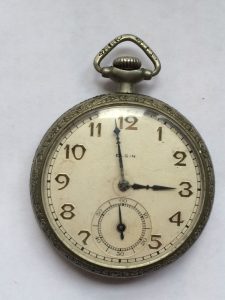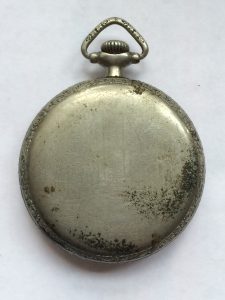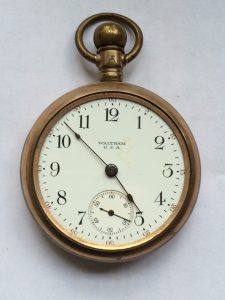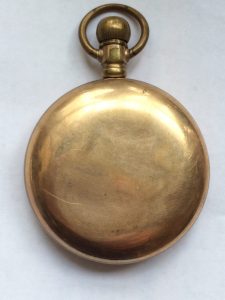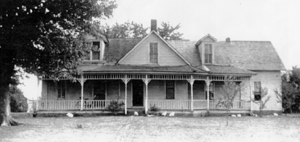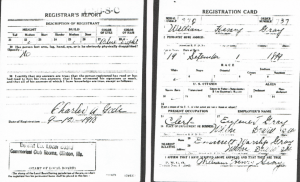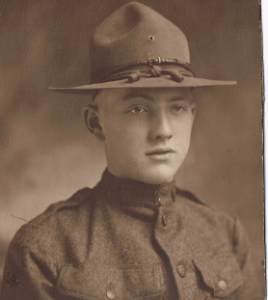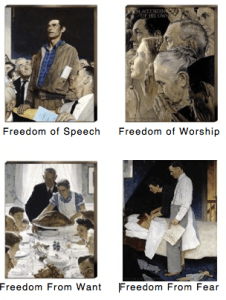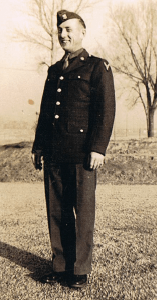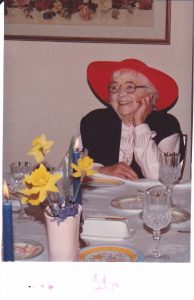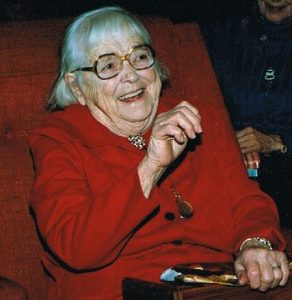80th Birthday Tribute to Harriet Gove O’Daffer (24 page booklet)
My wife, Harriet, passed away on September 27, 2021, after a thirteen year battle with Azheimers.
About 5 years into her illness, on July 6th, 2013– to honor her, and to provide a reference for our kids and grandkids about what she had accomplished– I wrote an “80th Birthday Tribute to Harriet Gove O’Daffer.” Harriet greatly enjoyed reading and rereading this tribute with family, friends, and caregivers.
Feel free to download this booklet, and remember again this wonderful woman.
Download a 24-page 80th Birthday Tribute to Harriet Gove O’Daffer written and published by Phares O’Daffer in 2013.
Obituary for Harriet O’Daffer: Loving Wife of 66 Years to Phares O’Daffer
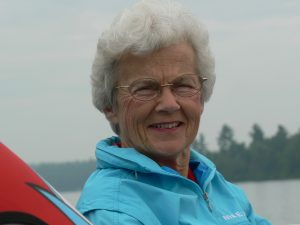 Harriet Gove O’Daffer passed away September 27 at Carle Bro-Menn Medical Center in Normal, Illinois, after a 13 year struggle with Alzheimer’s Disease. She was 87 years old.
Harriet Gove O’Daffer passed away September 27 at Carle Bro-Menn Medical Center in Normal, Illinois, after a 13 year struggle with Alzheimer’s Disease. She was 87 years old.
Harriet was born July 6, 1933 in Newton, Iowa to Sabin and Mildred Gove, who preceded her in death. She is survived by her husband of 66 years, Phares O’Daffer, as well as her sister Ellen (Robert) Greeley of Eureka, Ill. and brother Jack (Jean) Gove of East Peoria, Ill.
Also surviving are Harriet’s beloved children, daughters Sue (Bruce) Thornquist of Downers Grove, Ill.; Sara (Richard) Marberry of Evanston, Ill; and son Eric (Stacy) O’Daffer of Sammamish, Wa. Harriet deeply loved her grandchildren, Jordan Thornquist, Dana Thornquist, Lee Thornquist, and Wesley Marberry (Chicago); Alison O’Daffer (Seattle); and Will O’Daffer and Henry O’Daffer (Sammamish, Wa). They also survive her.
Honored as a McLean County Woman of Distinction in 1996, Harriet was a solid person who could always be counted on. She was admired and respected by her family, friends, and colleagues in her church and community.
Harriet loved her community, and was known for her volunteer work and leadership at Normal First United Methodist Church, Unit 5 School Board, Illinois Symphony Board, Illinois Shakespeare Society Board, and the Board of her beloved Baby Fold. Other cherished organizations were P.E.O and the Normal History Club.
After graduating from Illinois State University (ISU), Harriet was an outstanding fourth grade teacher for two years at Franklin School in Bloomington.
Harriet loved music, and greatly enjoyed playing her piano and singing. She also loved theater, the symphony, a good book, watching sports, playing golf and tennis, hiking, playing bridge, and experiencing a great trip. She was also a huge fan of the Chicago Cubs and the ISU Redbirds.
All of her life Harriet showed her love, devotion, and support for her husband, her children, their spouses, her grandchildren, and her friends, and they loved her very much.
Want to Know More About Harriet?
Download a 24-page 80th Birthday Tribute to Harriet Gove O’Daffer written and published by Phares O’Daffer in 2013.
Trying To Place A Value On Memories
For 68 years I have saved a little red leather box.
That little box has survived each of our sixteen moves, and always found it’s way to a safe drawer where, surprisingly, I always knew where it was, but rarely opened it.
But not long ago, a friend mentioned that he was having an old pocket watch he owned restored, and that got me thinking about whether I should do the same thing to the two pocket watches in my little red box.
A Trip to the Jewelry Store
I laid the two pocket watches on the counter and matter-of-factly said to the watch expert, “I have these two pocket watches and wonder if it would be worthwhile to have them restored? What do you think?”
The expert turned the winding knobs, looked the watches over real good, and, with the true air of someone who knows what he is doing, said, “Well, it would cost you more to fix these up than they would be worth.”
“I wouldn’t mess with ‘em. Pocket watches like these are a “dime a dozen.”
Driving Home
Reality set in as I drove home from the jewelry store.
The more I thought about what the watch expert had said, and the more I thought more about my watches, the angrier I got.
A dime a dozen indeed! He didn’t really know anything about my watches, and somehow I had ignored what I knew about them too.
It was on that ride home that I began to realize how valuable my watches really are.
The Value of the Watches
If you guessed this from the very beginning, you were right.
The silver-colored (Silver) watch belonged to my grandfather, Edmon Odaffer (1865-1945), and the gold-colored watch (Gold) belonged to my father, Ray Odaffer(1900-1950).
I don’t know where my father and grandfather bought their watches, but I bet a dollar it was from the Sears-Roebuck catalog.
(Richard Sears started a company that sold pocket watches through mail order catalogs in 1888, and a few years later he and Alvah Roebuck, renamed their expanded watch company Sears, Roebuck & Company.)
But the real value of the watches is what they symbolize, and the memories they invoke in me. I’d like to take a moment to explain this.
My Grandfather Edmon and His Watch
Edmon was a successful farmer. He knew how to do it, and he taught his only son, my father Ray O’Daffer, to do it, too.
And he was very proud of “the home place” where he had moved and fixed up a good country house for his family to live in.
When it came time for him to quit farming and turn it over to my dad, Ed did what a lot of farmers dream about doing when they retire–he moved to town!
In town, Ed developed a ritual based on who he thought he was–an important successful, retired farmer who had made something of his life.
Every day, Monday through Friday, Ed would get up around 7 a.m. (awfully late, in the mind of an old farmer), and enlist my grandmother Mattie to help him get ready. She would bring him a freshly washed and ironed white shirt, a necktie, and his one and only good black suit.
Then Ed polished and wound his silver pocket watch, attached the watch fob, and carefully placed it his suit watch pocket.
Ed, with a reputation for being a little hyper and a quick mover, would twist his mustache several times, check his watch again, and take off.
Ed would walk several blocks to Main Street in Weldon, Ill., and take his place on a bench in front of the Post Office–where he stayed until time for dinner (12 noon, in those days).
Some others on the bench may have thought Ed was a little kooky, but it did not deter him. He was as regular in going there as his prized silver pocket watch was in giving the time.
As I look back on this, perhaps the silver pocket watch is a symbol of my grandpa Ed’s life. He was a man who made good use of his time on earth, always gave his family and grandkids the time of day, was always on time for appointments, and was proud of himself and what he did and the legacy he left for his descendants.
My Father Ray and His Watch
Ray, following in Ed’s footsteps was also a good farmer. He was also a school board member and sold seed corn for a while.
He liked his gold pocket watch and carried it in the watch pocket in his overalls.
I remember many time watching him take out the watch and check the time—whether it was in the field deciding when to come for dinner, determining when to stop running the trap line with me so he could get me to school on time, or checking to see if it was time to tune in the “Lone Ranger” for us to listen to on the battery radio.
Ray greatly enjoyed his family, and checked his prized watch to see if the plane was on time when he met his first granddaughter baby, who had flown in from California.
Like his father Ed, Ray bought a house in the country and moved it to town—remodeling it for he and my mother Ruby to live in when they retired. He was looking forward to a rewarding retirement.
Sadly, my father Ray would not be able to retire and use the house, because he was killed in a farm accident on March 23, 1950, when he was 49 years old.
He got caught in a post-hole digger that was attached to the back of our Allis Chalmers tractor and was crushed. A terrible life-changing accident—for all of us.
As usual, on the day of his accident, his gold pocket watch was in his pocket.
If you look at the watch carefully, you can see that the front plastic face cover is missing, and there is a small dent on the back—perhaps evidence that the accident took a toll on the watch too.
So, as I look back on it, the gold watch is the symbol of my father’s golden life for 50 years, and for all the time and help he gave to our family and to me when I was growing up. It also symbolizes the special times in which he really enjoyed his shortened life, like the trip to the airport.
The Moral of This Watch Story
Instead of being worth “a dime a dozen,” my watches, because of the memories they evoke, are very valuable and precious. I wouldn’t sell them for any amount of money.
So maybe we should stop taking our antiques to the “Antiques Road Show” to be evaluated.
Rather, we should take time to think hard about the memories they evoke, what they symbolize, and determine their true value ourselves.
A Notable Veteran: William Henry Gray
Every Veterans Day I think about my Uncle Bill Gray — William Henry Gray, to be exact. He was the first veteran I ever knew.
It’s not that Uncle Bill was my favorite uncle to whom I was deeply devoted.
But he did play a role in my life. I recall him playing Pinochle with my family and taking me fishing a couple of times. He also gave me an army belt, some army uniform buttons, and an army hat. And he showed sympathy, as best he could, when my father was killed in a farm accident.
But this year was different. I decided to tell Uncle Bill’s story, which I have never done before.
Not just because the official goal of Veterans Day is “to pay tribute to all American Veterans — living or dead…”
Or because his story is so much more interesting than any other veteran’s story.
Rather, I’m telling his story out of respect for Bill Gray, because his story is notable, and because it may have a message for us on this Veteran’s Day.
Bill Gray and World War I
Bill Gray was born in 1899, in Weldon, Illinois.
When he finished high school, World War I was heating up, and he registered for the draft. (Click on the draft registration cards below to enlarge.)
Without thinking twice, Bill quit his job in Uncle Gene Gray’s dry goods store, passed up an offer to work in a bank, left a fairly serious girlfriend, and enlisted in the Army.
After basic training, he was shipped to Europe, where he fought in the infantry in 1918, during the latter stages of the war. According to my mother (Bill’s sister), Bill fought in France, and later, in Belgium.
He came home after the war, and tried to get his 20-year old life back in order. His girlfriend had died in a flu epidemic while he was gone, and life must have seemed pretty empty.
My mother said that it wasn’t easy for him.
Bill somehow felt lost in society and didn’t feel appreciated. His friends and relatives would simply say that “Bill is generally on the grumpy side.” No one thought much about Post Traumatic Stress Disorder in those days, instead blaming any soldier’s problem on “shell shock” or “battle strain.”
But as years passed, Bill began to feel a little better, and life went on.
Bill Gray and World War II
I was 7 years old when Pearl Harbor was bombed in 1941. Everyone in my broader family was worried when Bill announced that he was going back in the Army, to help, he said, “protect our countries four freedoms.”
When an adult, I asked my mother why he would have said something like that, and she reminded me that Roosevelt had given his famous “Four Freedoms Speech” about 11 months before the Pearl Harbor attack, and Bill had listened to it on the radio.
Roosevelt proposed four fundamental freedoms that people everywhere in the world ought to enjoy: Freedom of Speech, Freedom of Worship, Freedom from Want, and Freedom from Fear. Norman Rockwell was commissioned to paint the pictures.
Once I heard that Bill had mentioned the four freedoms, I framed prints of them, and kept them on my wall. (Click on the prints below to clarify.)
So, on Sept 9, 1942, Bill re-entered the Army to serve in WWII. He was 43 years old, and he was in “for the duration of the war + 6 months”
It was a serious “re-up” if there ever was one, coming 24 years after his first enlistment in WWI. And he left behind a fairly serious girlfriend named Frieda Belle Cackley.
When he returned from the war in 1945, Bill tried to start where he left off. But to the surprise of just about everybody, including Frieda Belle, it did not work out, and they were never married. Two wars had took their toll on Bill’s love life, ruining relationships with perhaps the only two serious girlfriends Bill had ever had.
I tried to get Uncle Bill to talk about his experiences — how he felt about leaving a bank job and a serious girl friend to go to WWI, and leaving a potential wife to go to WWII, and how it felt to come back.
But he simply did not want to talk about it. So I still wondered if he had ever felt thanked, and appreciated.
But, in the spirit of Paul Harvey, there is “a rest of the story.”
The Rest of the Story
In 1994, eight years after Bill Gray died, my wife Harriet and I traveled to Europe with our friends Herm and Evelyn Harding, and stopped off in Belgium to visit the family of our AFS Student, Phillipe Bastenier,
After we’d been there a couple of days, Phillipe’s father, Jacques, decided to have a big party for us, and invited all of his relatives.
As the party progressed, a wizened old man who had been sitting alone in a chair, got up and made his way over to Herm and I. I believe he said his name was Peter.
He placed a hand on each of our arms, and in broken English said “You are the Americans. I want to thank both of you from the bottom of my heart for all the help the American soldiers gave us in the two wars. When the Germans were about to overrun us, the Americans were always there with food and military help. I feel so much gratitude, and have always wanted to thank someone.”
As he explained further and expressed his gratitude again, we all three had tears in our eyes.
When I went to bed that evening, I recalled that Uncle Bill fought in Belgium in WWI, and suddenly it hit me.
Bill Gray, that very evening, was finally getting his thanks, through me, for helping preserve American Freedoms, and for helping preserve Belgium’s freedoms as well!
And somehow, I could see him hearing the Belgium thank you, reacting initially with his war-induced grouchy demeanor, but secretly cherishing the thank you for the rest of eternity.
And now you know the rest of the story!
What We Can Learn From Bill Gray’s Story?
When I think of Uncle Bill’s story, three things come to mind.
First, we live in a country that enjoys freedoms, including the Four Freedoms Bill Gray thought about when he re-entered the Army in World War II. There are people in many nations who would die for these freedoms, and have. The United States of America, warts and all, is a great place to live and a place to cherish and protect.
Second, From the Revolutionary War until today, our veterans, in the spirit of Bill Gray, have sacrificed in many different ways to protect our country’s freedoms. They are men and women, who, to the person, have given a portion of their life, and did what the military asked them to do.
Third, there are 23.2 million veterans in the United States, 9.2 million of whom who are over 65. We need to genuinely thank them for the sacrifices they have made on our behalf, even if the thank you is “a message from Belgium!”
And we need to improve medical services, like those Uncle Bill may have needed and didn’t get, so all can function effectively in society.
President Harry Truman who, like Uncle Bill, fought in the infantry in Europe in WWI, said.
“Our debt to the heroic men and valiant women in the service of our country can never be repaid. They have earned our undying gratitude. America will never forget their sacrifices.”
And this goes for you too, Uncle Bill.
A Tribute to My Poem-Writing Grandma Ruby
As many of you may know, my Grandma Ruby was well known for her poems.
She had a special poetic style–enhanced when she read her poems– that was unique as she captured issues and people of the day.
So that you can better understand what I am going to share, here are some excerpts from a couple of my favorite Grandma Ruby poems, “Seat belts”(1985) and “Modern”(1978)
Seat Belts
“The seat belts must be buckled now they say
And if you don’t, a fine you will have to pay.
This has brought about much discontent.
And many letters to officials have been sent.
I am not a sage or a wise man and so I can not say
What is the right thing to do this day…
To buckle up for some is just the thing to do.
They think it is safer that way too.
But for others, when the buckles are shut
Their temperature goes no way but up.
That feel of buckling the belt is real
And they can not help the way they feel.
To be tied to a fast moving machine
Is something toward which I can not lean…
Modern
This modern living I cannot see
What seems right to others seems wrong to me.
This modern style of talk and dress
I do not understand I confess…
Motivated to Write a “Ruby Poem”
A year ago, while driving back to Chicago from Champaign, Illinois, I found myself fixated on all the windmills that harnessed the wind to create electricity.
They peppered the landscape across central Illinois. There was a grace and beauty to them, even though they were gigantic and metallic–completely unnatural in the midst of Illinois farm and prairie landscapes.
For some reason, I began thinking about Grandma Ruby and envisioning how she would react to their presence. A poem took shape in my head, crafted in the special “Grandma Ruby” style that my family had come to know and love (and sometimes lapse into, in a good-humoured way).
I grabbed a small notepad that I kept in the car, and began scribbling some random lines that I thought might reflect her sentiments.. Later, I went back and put it together as a tribute to her. Here is the result…
This Modern World
What are those giants
I think I see
Towering in the sky
On top of me?
With arms flung wide,
They spin and spin.
With graceful movements,
Harnessing the wind.
So it’s a good thing
I can see
Finding new ways to
Create electricity.
But as I look
Across the land
In my gaze
They do stand.
Rows and rows of
Silver steel
So conflicted is
How I feel.
Instead of corn stalks,
Trees, a flower,
Metallic monsters
Make me cower.
To dot the earth
with these modern things
Goes against the past
That the older folk clings.
Progress is one thing
I do believe
But the natural beauty
We must leave.
*I love you Grandma. Happy (Grand)Mother’s Day 2015.
Sue O’Daffer Thornquist
A Tribute To My Mother
Introduction
On this Mother’s Day, 2015, I am reminded of my mother, and of a tribute I wrote to her when she died on January 4th , 2000.
Today, in her honor, I will post the tribute, and think back on her life.
I hope it will stimulate you to think of your mother, and of great mothers everywhere who have given all they had to raise their children and prepare them for their place in the world.
Ruby Gray Odaffer Atteberry (April 1, 1902- January 4, 2000)
Ruby – mother, mother-in-law, grandmother, relative, neighbor, and good friend. She was so special to many of us- a unique lady who we greatly enjoyed, and who will always have a strong, positive influence on our lives.
Maybe, somehow, we will find a way to tell her story to future generations, and impart some of her character and values to them.
A common comment from people of all ages who visited Ruby, was “I really enjoyed talking to her.”
What was there about this lady, who was born near Lane, Illinois, grew up in Weldon, Illinois, and lived near her home territory all of her life, that caused people to make this comment?
Ruby, always true to the lack of material possessions in her early life, never had very many extra wants or needs. She always had great respect for her family heritage, and continued to remember them through her poems, her interest in her ancestors, and her untiring support of the annual Gray Reunion.
As a woman who was valedictorian of her high school class, clerk in her uncle’s store, a country school teacher, a hard working farmer’s wife and mother, a superb cook, and an egg candler and chicken dresser, Ruby believed in working hard and doing a quality job.
Her memory was phenomenal… She could remember extraordinary details of what happened from when she was 2 or 3 years old on, as well as almost anything she had ever read. On nights when she couldn’t sleep, she would recite poetry or famous speeches she had memorized. She once said that she had recited for over two and one half hours.
She also loved to write poetry. When there was a plan to remove the statue of Abe Lincoln from the Clinton, Illinois square, it was Ruby’s letter to the editor with a poem that helped save the statue for posterity.
Her poems were always positive- and gave simple affirmation of family and spiritual values. We will never be able to read the poems the way Ruby did, but we will always read them with her special way in our memory.
Ruby was a very special mother. Her children vividly remember the love and teaching she gave, and her support through their growing years.
I remember, as a first grader having trouble learning to read, her sitting me on her lap and teaching me phonics in one evening. I never had trouble with reading again!
She taught her daughters and daughter-in-law the techniques of taking care of babies, and her simple, but effective, principles for raising children.
Ruby was always deeply interested in what her children, grandchildren, and great-grandchildren were doing, and dearly loved them all. To them, she was the “world’s greatest grandmother.”
She was loved not only by her grandchildren, but by the many neighbor children who also stopped by to talk with her, play Chinese checkers, Dominoes, or Aggravation, and sample some cookies. She had a special way with children, and they loved being around her.
Current affairs and “the state of the world and its people” always were of great interest to Ruby. She loved to talk about how things are, and compare them with how they used to be.
Her simple, straightforward approach to life was inspiring and contagious.
In her later years at Meadows Home, Ruby was always mentally alert. She adapted admirably to her many physical problems, and when asked how she was feeling, she either said “tolerable” or “with my fingers.” Her sense of humor was always in evidence.
When I fixed her clock and told her “That will be $10, please,” She came back with “Charge it!” Or when I cut her hair and said “You look like a million dollars!,” her quick response was “Without the zeros.”
Not long before she died, I told her that her situation was Y2K incompatible because her gravestone read 19 – – , and that if she lived to the year 2000, she would have a problem. Ruby gave that little smile, and told me “I’ve got worse problems than that, and anyway, I think that is more your problem than mine.”
As a young child, Ruby had perfect attendance for a long period of time in Sunday School and Church. In later years, she had a perception that her simplicity didn’t fit in, and didn’t attend Church much, but seemed to always live according to Christian principles, and approached life with a deep faith that just seemed to be a part of her.
To the end of her life, she seemed to always be thinking of others, and was amazingly generous with her caregivers. She rarely complained when we went to see her, and when we would leave for a week or two on vacation, she never gave us a guilt trip, but always simply said “you have a good time.”
Ruby once said that an uncle had told her as a child that she was made out of “rags, tags, and old paper bags,” and, in a very real sense, she never pretended to be made of anything much more fancy. She never put on airs. What you saw was what you got. She was Ruby.
But she had a special way, a depth of character, a simplicity, a way of relating to us that we will never forget.
We all know that she was made from very high quality stuff, and we love her very much.
Phares Glyn O’Daffer, January 4, 2000
Memories on Memorial Day- Some Old Time Values
As I brush the old dead grass off of the base of his gravestone, and place the fresh flowers beside it, I am reminded, on this Memorial Day, of my step-father, William (Willie) Atteberry.
He is not an official entry on my genealogy family tree, but somehow it feels like he should be.
He was not a veteran, but he was a patriotic citizen who loved his country, and helped preserve it.
I treasure him because of what he did for my mother, for her kids (including me), for her grandkids (our children), and simply for the uniquely fine human being that he was.
I highly suspect that his character and many of his values were a reflection of the era in which he lived, but I’m just biased enough to think that, this notwithstanding, he was something special.
I’ve decided to reprint the eulogy I wrote for Willie when he died, so maybe you can see what I mean.
_________________________
William Edgar Atteberry 1895-1992 — A husband, a father, a father-in-law, a stepfather, a grandfather, a relative, a friend. What was it that made him so special — a genuine article — a one of a kind?
And how do you measure the influence a man like this has had on others in his lifetime, and the nature of his lasting influence.
In years, decades, even centuries to come a little girl or boy — descendants of Willie Atteberry or others who knew him well — will sit on their mother’s or father’s lap and hear about how important it is to be honest, to tell the truth, make your word good, to treat others as you want to be treated, and to pay your debts on time.
They will be told that on a job, you should always get there early and give an honest days work. They will hear about the value of good black soil, the good things about farming, and how a young man named Willie who came to central Illinois with 35¢ in his pocket went on to become a successful farmer.
They will hear how important it is to conserve resources — to tile and plant fields well so the soil won’t wash away, and to plant trees so future generations can enjoy them. And yes, they will hear the philosophy that if you earn a nickel you should save at least 4¢.
They will hear about the importance of minding your own business, treating others fairly, but not letting anyone push you around. They will learn the virtues of good country food, horses, and cow’s milk. They will hear that a good life is being generous, and helping those in need.
They may even hear a simple, inspiring story about how a small boy, with no mother and limited support from his father, ran away from an uncaring relative’s home at the age of 7 years and made it on his own by being honest, living a clean life, and by putting in a lifetime of hard work.
William Atteberry — educated, but with no formal education beyond the early grades. A man who claimed that without education a person “doesn’t have any more chance than a one-legged man in a rump kicking contest” — but a man who had a Ph.D. degree, with highest honors, in common sense.
William Atteberry — a model of simple everyday application of religious principles, an inspiration to those around him, and a solid person you could always count on.
William Atteberry — independent, strong minded, but one who knew who he was, what he stood for, and who was successful in the finest sense of the word. He often said that, living on the “poor farm,” he might have to “get a tin bill and pick with the chickens.” You never had to, Willie, and you never will.
Phares O’Daffer, October, 1992
A Witty Elderly Ancestor With A Sense of Humor
My 97 year old mother, Ruby, who was living in the Meadows Nursing Home in Central Illinois for the last 10 years of her life, had a very weak body but a sharp mind — and you never knew what she was going to say.
She was a living testimony to the fact that some people don’t lose their wittiness or sense of humor just because they get old.
Some Ruby Stories
I had been in her room a while — working on her favorite clock that wouldn’t even run a mite.
I thought she was a bit subdued, but maybe she was just worried that her designated clock fixer just didn’t have it.
“Well, I’ve fixed your clock,” I finally said proudly. “That’ll be $10, please.” “Charge it!” she shot back, without skipping a beat.
______
“Oh, that’s way too much,” Ruby exclaimed with conviction when I plopped the medium chocolate malt down on her bed stand. “I couldn’t possibly drink all that.”
Then, 10 minutes later, I heard that loud “slurpppp” that can only be caused by someone sucking on a straw, hoping against hope to get just a little more good stuff from the bottom of the container.
Then, looking up with a large smile, Ruby deadpanned, “Well how on earth did that happen?”
______
“I need a haircut today,” said Ruby, who adamantly refused to use the hair dresser services at the nursing home.
And I, her only son — with a very limited skill set — was her choice as cutter. Probably only because of proximity.
She was not at all worried that I couldn’t give her the needed thinning, so I proceeded to “snip, snip, snip,” as I whittled her mop of hair down to size.
“Okay, I’m finished cutting your hair. You look like a million dollars,” I said.
“Without the zeros,” she quipped with that wry smile.
______
Ruby had few psychological hangups, but adjusting to new eye glasses was one of her downfalls.
It happened more than once. A trip to the optometrist, a test, quite a time choosing frames, and finally, trying on the the new glasses.
“I can’t see out of these glasses,” she said, as she put them on her table and put the old ones back on.
“Just try them, Mom, you have to wear new glasses for a while to get used to them,” I replied.
After half-heartedly trying for a few days, she pronounced, “They don’t work. I don’t see right.”
“You couldn’t see with the old ones when you were getting your eyes tested,” I said. “What do you say to explain that?”
“I say that some things just can’t be explained,” she responded with a voice of finality. And that was that.
______
“So you took Dana (our grandkid, her greatgrandkid) to the dinosaur display at the museum, huh?” Ruby asked. “How did it go?”
“She really enjoyed it,” I said. “It was a wonderful display, and the dinosaurs were so amazingly realistic.”
“So how would you know about realistic dinosaurs?” she asked with a twinkle in her eye. “Just how many real dinosaurs have you seen in your life?”
______
I asked Ruby what she wanted for her 97th birthday, which was fast approaching.
“I would like to have some bacon,” she asserted without a second thought.
Her cholesterol was approaching 200, and she hadn’t been allowed to eat bacon. But she was going to be 97 years old, and that should count for something.
“Bacon it is, then,” I said.
We brought in a cake and used the kitchen to cook some bacon.
When Ruby had eaten more bacon that one would think possible, it was time for dessert.
“Do you want some cake, Mom?” I asked. “It looks pretty good.”
Ruby looked at the cake, looked as my wife Harriet and I, smiled, and said, “Well, if I have to make a choice, you take the cake — I’ll take the extra bacon.”
_______
“The doctor. is coming to see you today,” I said. “Think of some questions you want to ask him.”
“Okay, my arthritic hands are causing me a lot of problems,” Ruby answered with obvious concern. “The fingers bend both ways and way back.”
“Well, maybe the doctor can give you some help on that,” I said.
“He’d better,” Ruby responded decisively, “If he says it’s just old age and nothing can be done, we may have to get an older doctor.”
______
I walked in her room on December 22, 1999. The idea of my computer being Y-2K compatible (being able to not get all screwed up when the year changed from 1999 to 2000) was on my mind.
“You’ve got a problem,” I said, as I looked her in the eye.
She knew I was setting something up.
“What do you mean, I’ve got a problem?” She frowned, as if to say that if she had a problem, she’d know it.
“You’re not Y-2K Compatible,” I said.
“What do you mean by that?” she asked. I explained the Y-2K compatible idea, and she allowed she had seen things about it on TV.
“Why do you say I’m not Y-2K compatible?” she asked.
“It’s like this,” I said with feigned seriousness. “If you die after the end of the year, your gravestone will be all screwed up. Etched in stone, it now reads ‘Ruby Odaffer, 1902 – 19 – – .’ But then it should read 1902 – 2000. What are you going to do with the ’19’ ? ”
“Well,” she said with an air of finality and a bit of smugness for getting the last word. “ I’ve got worse problems than that. Furthermore, the way I figure it, it’s more your problem than mine.”
Postscript
My mother died on January 4, 2000, shortly after our Y-2K conversation.
She was absolutely right. Y-2K was my problem, not hers. It took me four months to get a new gravestone from North Carolina.
I look back fondly on these, and many other instances of my mother’s wit and good humor.
There is something beautiful about an ageless wittiness and sense of humor.



